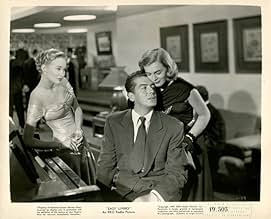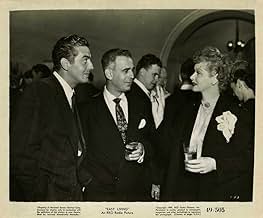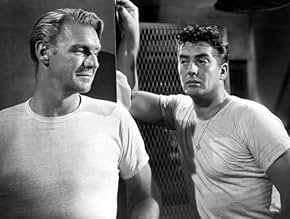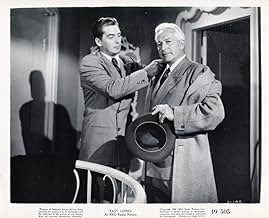Füge eine Handlung in deiner Sprache hinzuPete Wilson is on top. He is the highest paid professional football player in the league. He has seen other players come and go, but he was MVP last year and the future looks rosy. His wife,... Alles lesenPete Wilson is on top. He is the highest paid professional football player in the league. He has seen other players come and go, but he was MVP last year and the future looks rosy. His wife, Liza, is there for the fame, the money, the good times and does not like those who are wa... Alles lesenPete Wilson is on top. He is the highest paid professional football player in the league. He has seen other players come and go, but he was MVP last year and the future looks rosy. His wife, Liza, is there for the fame, the money, the good times and does not like those who are washed up. His friend Tim, just retired and accepted a job as head coach at State. But Pete ... Alles lesen
- Regie
- Drehbuch
- Hauptbesetzung
- Buddy Morgan
- (as Dick Erdman)
- Dr. Franklin
- (as James Backus)
Empfohlene Bewertungen
First seen in 1949 at age 11, I looked for it again at Video Vault. It was issued in VHS so you can buy it or rent it if you look. Incidentally, RKO pictures weren't usually big hits 50 years ago but are sought after these days for their grit and on location filming. Savvy sellers in eBay include RKO in their headline.
Final comment: Unlike 2007's major hits like Pirates #3 and Potter #5, this film has an actual story, beginning, middle, end ---not relying on an overpowering musical score to sugarcoat junk. It's apt to appeal to grown-ups --- actually 11 and up.
The other story centers on the quarterback's troubled relationship with his ambitious, social-climbing wife who's not above using her seductive charm to make a success of her interior decorating business. Here again there are intriguing insights into the world of 1949, where "uppity" women had to be taken down a notch or two lest they forget their proper roles as wives and mothers.
These two stories don't merge particularly well, resulting in an awkward blend of "locker room" and "Park Avenue," and the ending seems forced and unconvincing. (This may have been due to the Production Code's dim view of divorce.) However, the cast still makes the movie worth a look, with solid work from Lucille Ball, Lloyd Nolan, Jim Backus, Art Baker, Jack Paar, etc. Lizabeth Scott -- she of the spectacular eyebrows -- seems a tad "overheated" as the self-centered wife but the script probably forced this kind of performance. Victor Mature has the better part and he acquits himself in adequate fashion. In his locker room scene he gets to strip off his shirt and thus reveal one of the great torsos in the movies. (And how gloriously it was soon to be whipped and otherwise tortured in such films as "Samson and Delilah," "The Robe," "Zarak," and "Timbuktu.") Too bad the movie as a whole isn't equal to its star's chest measurement.
Victor Mature is a New York gridiron hero whose game is starting to slow down; in fact, he finds out he has a heart ailment which spells early death if he keeps on playing. But his quest for a cushy coaching job is handicapped by his ambitious wife (Lizabeth Scott). She's not cut out for the den-mother duties a coach's wife must shoulder, as she's trying to make a success of her interior design business despite her own handicap of commanding neither taste nor talent a handicap she overcomes by luring monied clients romantically. So in addition to his health and career crises, Mature faces a marital one as well.
The large cast includes Lloyd Nolan as the club's owner and Lucille Ball as his widowed daughter-in-law, who works for the team and nurtures a crush on Mature. Tourneur shows his craft in coaxing a subdued and touching performance from her; he surpasses that by drawing from Scott, especially in a self-pitying drunk scene, the only piece of real acting she ever committed to film.
Easy living ends too abruptly (it clocks in at only 78 minutes) but there's nary a false note or a slack stretch in it. Made near the peak of the noir cycle, which accounts for its minor-key tonality (the score, by the way, is by Roy Webb), it springs yet another surprise in being one of the first films to find a dark side in that American institution, professional football.
Wusstest du schon
- WissenswertesThe white football seen in the warm-ups for the night game at the end of the film was used in the NFL for such games from 1929 to 1955. It was considered to be more visible to the players and fans than the typical brown football. By 1956 better stadium lighting, especially needed for television, made the white football obsolete.
- PatzerThough the team's name is the Chiefs, their helmets have horns on them like the NFL's Los Angeles Rams.
- VerbindungenFeatured in Jagt den Fuchs (1966)
Top-Auswahl
- How long is Easy Living?Powered by Alexa
Details
- Laufzeit
- 1 Std. 17 Min.(77 min)
- Farbe
- Seitenverhältnis
- 1.37 : 1




































